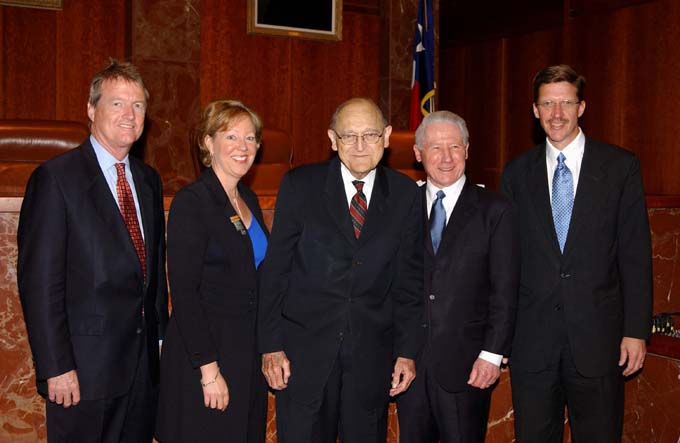Baylor And UT Law Schools Announce Scholarships For Future Legal Aid Lawyers

Speakers at the scholarship announcement in Austin included, from left, UT Law Dean Bill Powers, Supreme Court of Texas Justice Harriet O'Neill, Judge William Wayne Justice, James B. Sales, chair of the Texas Access to Justice Commission, and Baylor Law Dean Brad Toben.
Just weeks after an historic Supreme Court of Texas hearing on the status of legal services for the poor, Baylor Law School and the University of Texas Law School have agreed to provide scholarships for students who commit to practice law with recognized legal aid providers.
The joint announcement was made Tuesday morning at the Supreme Court of Texas courtroom in Austin during a press conference called by the Texas Access to Justice Commission (TAJC). Supreme Court of Texas Justice Harriet O'Neill, Baylor Law Dean Brad Toben, UT Law School Dean Bill Powers, and James B. Sales, TAJC chair, were among speakers during the program.
The two law schools have established the Equal Justice Scholarships, which will be awarded to students with strong academic credentials as well as demonstrated commitment to public service. Upon graduation from law school, the scholarship recipients, in accordance with their commitment, will practice law at legal aid organizations for at least three years.
Toben said, "Baylor Law School's program instills in our students that the law, and their privilege as members of the bar, must be used to serve all the citizens of our state and nation, including most importantly, those who are marginalized. This scholarship program will make it possible for our graduates to serve where they are truly most needed."
Baylor Law School has committed to fund two Equal Justice Scholarships, collectively valued at $143,000. The first scholarship will begin in 2005; the second will begin in 2007. U.T. School of Law's William Wayne Justice Center has committed to fund three scholarships, collectively valued at $135,000. UT will implement one scholarship each year over the next three years. Both law schools will evaluate the possibility of funding additional scholarships in the future.
The Texas Access to Justice Commission, charged with overseeing the legal aid delivery system in Texas, has worked closely with the two law schools to implement the scholarship program. Sales, chair of the commission and a partner in the Houston office of Fulbright and Jaworski, said he hopes that other Texas law schools will be encouraged to create similar scholarships.
"Texas law schools have the unique and professionally important opportunity to instill in their students the importance of affording access to our justice system to all residents of Texas, regardless of their economic status," Sales said. "Once again, UT and Baylor have assumed a leadership role in the legal profession's service to the community and have demonstrated their commitment to equal justice under the law. The commission is endeavoring to work with all Texas law schools to implement some form of scholarship program that will, in the long term, provide more lawyers to serve poor and low-income Texans."
The commission notes that according to the American Bar Association (ABA), law school graduates carry an average of $77,000 in school loan debt. Yet, the average entry-level salary for a legal aid attorney is approximately $36,000 per year. The ABA recommends several strategies to alleviate the burden, including loan repayment or forgiveness programs and law school scholarships and fellowships for graduates who are willing to practice law with legal aid providers.
Currently in Texas, according to the commission, legal aid meets only 25 percent of the legal needs of poor Texans. "To address this dilemma, the Texas Access to Justice Commission has undertaken a broad-based approach to increase access to the justice system for the poor," it points out. "In 2002, the commission created the Texas Student Loan Repayment Assistance Program to assist legal aid lawyers with law school loan debt. To date, the commission has provided more than $45,000 to legal aid lawyers in Texas. The State Bar of Texas recently committed an additional $70,000 to the program. Despite these efforts, student loan repayment presents a major obstacle to graduates working for legal aid providers."
The commission says it has also launched an ambitious five-year strategic plan, which includes the creation of an endowment fund, increasing corporate support, formulating programs to expand pro bono legal services and engaging law schools in legal aid issues.
The Texas Access to Justice Commission (www.texasatj.org) was created by the Supreme Court of Texas to coordinate legal aid services for poor Texans. The Commission is charged with increasing resources for legal aid and developing policy initiatives to increase access to the legal system for Texas' most vulnerable residents.